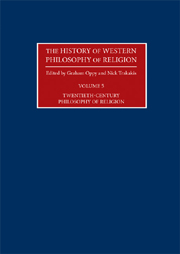Book contents
- Frontmatter
- Contents
- Editorial Introduction
- Contributors
- 1 Twentieth-Century Philosophy of Religion: An Introduction
- 2 William James
- 3 Henri Bergson
- 4 John Dewey
- 5 Alfred North Whitehead and Charles Hartshorne
- 6 Bertrand Russell
- 7 Max Scheler
- 8 Martin Buber
- 9 Jacques Maritain
- 10 Karl Jaspers
- 11 Paul Tillich
- 12 Karl Barth
- 13 Ludwig Wittgenstein
- 14 Martin Heidegger
- 15 Emmanuel Levinas
- 16 Simone Weil
- 17 A. J. Ayer
- 18 William P. Alston
- 19 John Hick
- 20 Mary Daly
- 21 Jacques Derrida
- 22 Alvin Plantinga
- 23 Richard Swinburne
- 24 Late-Twentieth-Century Atheism
- Chronology
- Bibliography
- Index
19 - John Hick
- Frontmatter
- Contents
- Editorial Introduction
- Contributors
- 1 Twentieth-Century Philosophy of Religion: An Introduction
- 2 William James
- 3 Henri Bergson
- 4 John Dewey
- 5 Alfred North Whitehead and Charles Hartshorne
- 6 Bertrand Russell
- 7 Max Scheler
- 8 Martin Buber
- 9 Jacques Maritain
- 10 Karl Jaspers
- 11 Paul Tillich
- 12 Karl Barth
- 13 Ludwig Wittgenstein
- 14 Martin Heidegger
- 15 Emmanuel Levinas
- 16 Simone Weil
- 17 A. J. Ayer
- 18 William P. Alston
- 19 John Hick
- 20 Mary Daly
- 21 Jacques Derrida
- 22 Alvin Plantinga
- 23 Richard Swinburne
- 24 Late-Twentieth-Century Atheism
- Chronology
- Bibliography
- Index
Summary
John Harwood Hick was born in Scarborough in Yorkshire on 20 January 1922, the son of a solicitor. He had initially planned to follow the same career, and embarked on the study of law at University College, Hull, but as a result of a conversion experience decided to train for the ministry instead. At this point his career was interrupted by the Second World War. As a committed pacifist, Hick was a conscientious objector to military service, joining instead the Friends' Ambulance Unit in Egypt, Italy and Greece. When the war ended Hick went to Edinburgh University where he took a first in philosophy followed by a DPhil at Oxford on the relationship between faith and knowledge, for which he was supervised by the then Professor of Logic, H. H. Price. Hick's theological training for the Presbyterian ministry was done at Westminster College, Cambridge, and he was ordained to that ministry in 1953. For three years he was a minister in Northumberland where he converted his doctoral thesis into his first major publication. This led to an assistant professorship in philosophy at Cornell. In 1959 he became Stuart Professor of Christian Philosophy at Princeton Theological Seminary. After six years there, Hick returned to Cambridge, initially as a sabbatical Bye-Fellow at Gonville and Caius College, and then as a lecturer in philosophy of religion in the Theological Faculty of Cambridge University.
- Type
- Chapter
- Information
- The History of Western Philosophy of Religion , pp. 233 - 244Publisher: Acumen PublishingPrint publication year: 2009



